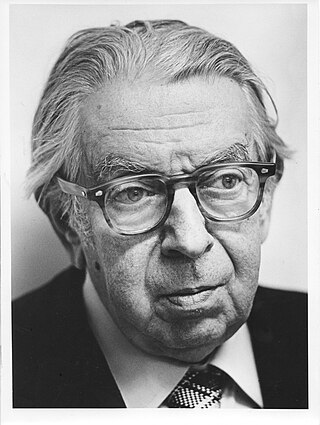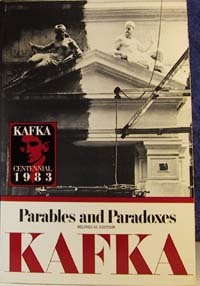

Letter to His Father (German : Brief an den Vater) is the name given to a letter Franz Kafka wrote to his father, Hermann, in November 1919.


Letter to His Father (German : Brief an den Vater) is the name given to a letter Franz Kafka wrote to his father, Hermann, in November 1919.
According to Max Brod, Kafka gave the letter to his mother to deliver to his father but she never did. [1] The original letter, 45 pages long, was typewritten by Kafka and corrected by hand. Two and a half additional pages were written by hand. [2]
In 1954, the letter, translated into English by Ernst Kaiser and Eithne Wilkins, was published by Schocken Books in Dearest Father: Stories and Other Writings. [3] In 1966, Schocken Books published the same translation in a bilingual edition. [4]
A new translation by Hannah and Richard Stokes was published by Oneworld Classics in 2008 under the title Dearest Father.
Extracts from the letter, translated by Sophie Prombaum, are included in A Franz Kafka Miscellany. [5]
The letter begins as follows: "Dearest Father, You asked me recently why I maintain that I am afraid of you. As usual, I was unable to think of any answer to your question, partly for the very reason that I am afraid of you, and partly because an explanation of the grounds for this fear would mean going into far more details than I could even approximately keep in mind while talking. And if I now try to give you an answer in writing, it will still be very incomplete." [6]
The following collections include Kafka's Letter to His Father (Kaiser and Wilkins translation):

Franz Kafka was an Austrian-Czech novelist and writer from Prague. He is widely regarded as a major figure of 20th-century literature; he wrote in German. His work fuses elements of realism and the fantastic. It typically features isolated protagonists facing bizarre or surrealistic predicaments and incomprehensible socio-bureaucratic powers. It has been interpreted as exploring themes of alienation, existential anxiety, guilt, and absurdity. His best known works include the novella The Metamorphosis and novels The Trial and The Castle. The term Kafkaesque has entered English to describe absurd situations like those depicted in his writing.

Amerika, (German working title Der Verschollene, "The Missing") also known as The Man Who Disappeared (Amerika), Amerika: The Missing Person and Lost in America, is the incomplete first novel by author Franz Kafka (1883–1924), written between 1911 and 1914 and published posthumously in 1927. The novel originally began as a short story titled "The Stoker". The novel incorporates many details of the experiences of his relatives who had emigrated to the United States. The commonly used title Amerika is from the edition of the text put together by Kafka's close friend, Max Brod, after Kafka's death in 1924. It has been published in several English-language versions, including as Amerika, translated by Edwin and Willa Muir (1938); as The Man Who Disappeared (Amerika), translated by Michael Hofmann (1996); as Amerika: The Missing Person, translated by Mark Harman (2008), as Lost in America, translated by Anthony Northey (2010), and as The Man Who Disappeared (America), translated by Ritchie Robertson (2012).

The Castle is the last novel by Franz Kafka. In it a protagonist known only as "K." arrives in a village and struggles to gain access to the mysterious authorities who govern it from a castle supposedly owned by Graf Westwest.

"The Judgment", also translated "The Verdict", is a short story written by Franz Kafka in 1912, concerning the relationship between a man and his father.

Michael Kohlhaas is a novella by the German author Heinrich von Kleist, based on a 16th-century story of Hans Kohlhase. Kleist published fragments of the work in volume 6 of his literary journal Phöbus in June 1808. The complete work was published in the first volume of Kleist's Erzählungen (novellas) in 1810.

Nahum Norbert Glatzer was an Austrian and American scholar of Jewish history and philosophy from antiquity to mid 20th century.
"The Village Schoolmaster", or "The Giant Mole" is an unfinished short story by Franz Kafka. The story, written in December 1914 and the beginning of 1915, was not published in Kafka's lifetime. It first appeared in Beim Bau der Chinesischen Mauer. The first English translation by Willa and Edwin Muir was published by Martin Secker in London in 1933. It appeared in The Great Wall of China. Stories and Reflections.
The Blue Octavo Notebooks is a series of eight notebooks written by Franz Kafka from late 1917 until June 1919. The name was given to them by Max Brod, Kafka's literary executor, to differentiate them from the regular quarto-sized notebooks Kafka used as diaries. Along with the octavo notebooks, Brod also found a series of extracts copied out and numbered by Kafka. Brod named this brief selection "Reflections on Sin, Suffering, Hope, and the True Way" and included it in The Great Wall of China.

The diaries of Franz Kafka, written between 1910 and 1923, include casual observations, details of daily life, reflections on philosophical ideas, accounts of dreams, and ideas for stories. Kafka’s diaries offer a detailed view of the writer's thoughts and feelings, as well as some of his most famous and quotable statements.

The Sons is a collection of stories by Franz Kafka.

Parables and Paradoxes is a bilingual edition of selected writings by Franz Kafka edited by Nahum N. Glatzer. In this volume of collected pieces, Kafka re-examines and rewrites some basic mythical tales of the Israelites, Ancient Greeks, Far East, and the Western World, as well as creations of his own imagination.

Dearest Father: Stories and Other Writings is a collection of writings by Franz Kafka translated by Ernst Kaiser and Eithne Wilkins with notes by Max Brod. The title derives from Kafka's Letter to His Father, which begins with this salutation. In 2007, a translation by Howard Colyer, titled Letter to My Father, was published by lulu.com. A translation of Dearest Father, with notes and an introduction by its translators, Hannah and Richard Stokes, was published in 2008.
"A Little Fable" is a short story written by Franz Kafka between 1917 and 1923, likely in 1920. The anecdote, only one paragraph in length, was not published in Kafka's lifetime and first appeared in Beim Bau der Chinesischen Mauer (1931). The first English translation by Willa and Edwin Muir was published by Martin Secker in London in 1933. It appeared in The Great Wall of China. Stories and Reflections.

Letters to Family, Friends, and Editors is a book collecting some of Franz Kafka's letters from 1900 to 1924. The majority of the letters in the volume are addressed to Max Brod. Originally published in Germany in 1959 as Briefe 1902-1924, the collection was first published in English by Schocken Books in 1977. It was translated by Richard and Clara Winston.

Letters to Milena is a book collecting some of Franz Kafka's letters to Milena Jesenská from 1920 to 1923.
"On Parables" is a short story fragment by Franz Kafka. It was not published until 1931, seven years after his death. Max Brod selected stories and published them in the collection Beim Bau der Chinesischen Mauer. The first English translation by Willa and Edwin Muir was published by Martin Secker in London in 1933. It appeared in The Great Wall of China. Stories and Reflections.
"My Neighbor" is a short story by Franz Kafka. It was written in 1917 and published in 1931 in Berlin by Max Brod and Hans-Joachim Schoeps. The first English translation by Willa and Edwin Muir was published by Martin Secker in London in 1933. It appeared in The Great Wall of China. Stories and Reflections.
Ernst David Kaiser was an Austrian writer and translator.

Franz Kafka's life (1883-1924) and connection to Judaism is covered in the main article Franz Kafka. Additional discussion is provided here.
Eithne Wilkins was a Germanic Studies scholar, translator and poet from New Zealand.